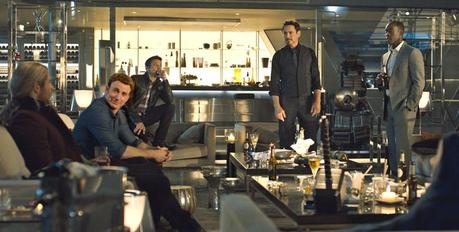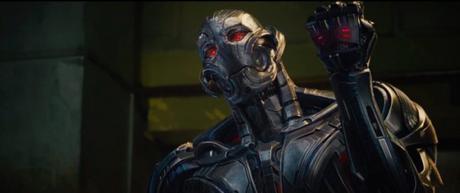In honor of the release of Captain America: Civil War, We Minored in Film’s Julianne Ramsey will examine the Marvel Cinematic Universe as it stands.
Day 11: Avengers: Age of Ultron (2015)
This is probably true of any genre, but superhero movies work best when there’s an auteur with a clear, distinctive vision in the director’s chair. Winter Soldier works because the Russo brothers recognized the appeal of placing anachronistic, idealistic Steve Rogers in a government conspiracy thriller. James Gunn’s Guardians of the Galaxy works because it’s infused with Gunn’s humor/ action hybrid roots. It’s basically Star Wars crossed with Serenity and injected into the Marvel Cinematic Universe, and Joss Whedon’s The Avengers works because it has his particular brand of character-based humor and genre convention skewering that defines Whedon’s pop culture contributions. When he’s at his best, and given free reign, he’s able to take characters involved in universe-altering scenarios (Buffy, Angel, the Serenity crew) and force them to balance the apocalypse with daily life minutiae. They may be destined for greatness but they will bicker and retort like…well, like individuals who have had their dialog penned by Joss Whedon. Age of Ultron feels like Whedon was forced to tone down his signature emphasis on relationship tedium and just stick to the superhero template. Whedon has a tendency to insist his characters never lose their humanity and that there is no cliché that cannot be undercut with a joke. That’s not entirely true here.
Unfortunately, when I watch Age of Ultron, I feel like this a film created by Marvel with little Whedon interjections sprinkled throughout. I see Whedon’s touches here and there, most notably in the party scene that happens early on and some of the film’s one-liners, but Age of Ultron feels less distinctive and fully formed than Whedon’s initial Avengers outing. It’s a film made out of obligation, not love.

The film’s plot revolves around a psychologically manipulated Tony Stark and his quest to create the ultimate, technologically-based, peace-keeping tool. Unfortunately, he creates a sarcastic, computer-based nightmare machine determined to bring about peace in the only way he understands: humanity’s destruction. Oh, yeah, and Hawkeye (Jeremy Renner) has a family, complete with pregnant wife, and Black Widow (Scarlet Johannson) wants to date Bruce Banner (Mark Ruffalo). I mention those plot points flippantly, because that’s about how the movie introduces them. While I appreciate the film’s attempt at making Hawkeye interesting, it’s too little, too late. A potential romance between Black Widow and Bruce Banner could be compelling, but it also feels a bit sudden. Black Widow has been in 4 films, and she’s had 4 different potential love interests (Tony Stark, Hawkeye, Steve Rogers, and now Banner). How do you inject angst and pathos into a character whose relationships appear so fluid and inconstant?
The film opens with our gang trying to retrieve Loki’s staff (note to filmmakers: If Loki’s not in your film, don’t remind us that Loki has been around. We’ll just miss him more). However, the gang isn’t prepared for the orphaned refugees turned lab rats that are Quicksilver (the charisma-void that is Aaron Taylor Johnson), who can run like The Flash, and the Scarlet Witch (Elizabeth Olsen), who has telepathic abilities. These characters are the beginning of what doesn’t entirely work in Age of Ultron. Olsen fares better than Johnson, perhaps because she is not having to compete with X-Men: Days of Future Past’s Even Peters’ Quicksilver. Granted, Peters didn’t have to contend with a poorly-realized Russian accent, and Taylor-Johnson never gets to interact with “Time in a Bottle.” Peters feels like a film highlight, and Aaron Taylor Johnson feels like a bland alternative. Olsen is a more interesting addition, as the film at least attempts to give her an arc, but she’s not a compelling enough presence to make her eventual joining of the Avengers feel anything other than perfunctory. Granted, 50% of these new characters aren’t around for another Marvel film, but their addition just makes the film feel overstuffed.

It probably sounds like I’m being too hard on Age of Ultron, but my feelings now are more of resignation than of disappointment. Upon first viewing, it felt like a massive letdown, briefly punctuated with flashes of the fun, character-based film Joss Whedon wanted to make. Now, it feels like an okay superhero film that could have been more if it had been allowed to breathe and settle. Every time the film feels as though it is about to try something interesting or idiosyncratic, the omnipotent hand of a producer beats it back into submission. Upon rewatch, I’m a little more charitable towards it. The problems I have are still present, but they don’t bother me as much as they did, and the moments that work- the Avengers team attempting to lift Thor’s hammer, a lot of the individual jokes-stand out a bit more. It’s certainly weaker than Whedon’s previous effort, but it’s always watchable and there are worse labels to apply to a summer blockbuster.
Next, Julianne takes a trip to the quantum realm and one final trek into the Marvel Rewatch with Ant-Man.

